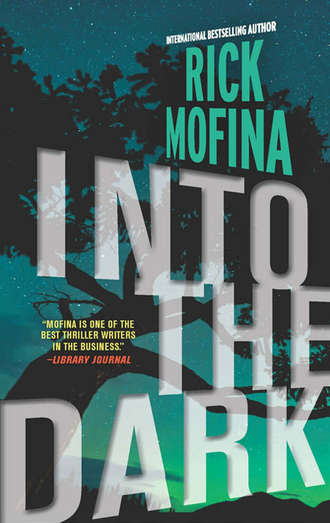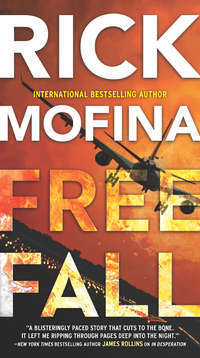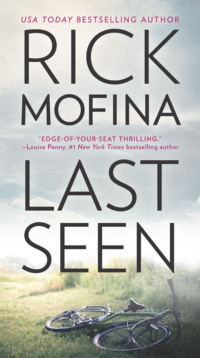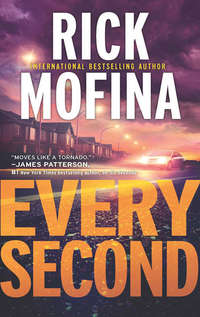
Полная версия
Into the Dark
“Which is?”
“We may not be as intelligent as he is, but we’ll do everything in our power to find him.”
12
San Marino, California
The morning after the accident, Claire woke before her alarm and reached toward Robert’s side of the bed.
It was empty.
She lifted her head and looked at their bathroom. The door was open. The light was off. Maybe he couldn’t sleep? His body clock was always out of whack because he often flew across several time zones.
But his last trip had been entirely in Pacific time.
It didn’t really matter, she thought, he was always up at all hours prowling around like a cat.
It was 5:50 a.m.
She got out of bed, tired but cheerful from yesterday’s good news as she pulled on her robe and started for the kitchen to make coffee. Padding through their Spanish-style home, she noticed that the door to Robert’s office was closed. Light spilled from the bottom. She raised her hand to the doorknob but froze when she heard Robert’s voice. It was low and she only picked up bits of the conversation.
“No, I don’t want to do that... Are you listening, Cynthia... No...”
Cynthia? Claire puzzled. Is he talking to his ex-wife? What’s going on?
Robert was coming to the door. Claire left for the kitchen expecting to hear him behind her.
She didn’t.
She shrugged it all off, attributing any qualms to her early-morning grogginess. She made coffee, then went to their front step to collect the Los Angeles Times, the Pasadena Star-News and USA TODAY. Despite her pleas to save trees, Robert had insisted on the subscriptions. He was a news junkie.
She scanned the Times, finding a story on the accident inside under the headline Miracle Rescue in Fiery Freeway Crash. There was a dramatic photo of a car in flames taken from the video a motorist had recorded with his phone camera. Accompanying the story was a small picture of Robert at the hospital with the caption Hero Pilot Robert Bowen Saved Mother and Baby. They had seen TV news reports of the accident and rescue last night. Their phone rang with congratulatory calls from friends and interview requests from reporters.
Claire was proud of him.
After her first cup of morning coffee, a bagel with peaches, and daydreaming about a nursery, she got into the shower. She tried taking inventory of the day ahead, but as the steam clouds rose around her, Claire was carried back through time, back to her deepest wound. Her Grand Canyon of pain...
...Her father is gripping the handgun, pointing it to the ceiling, keeping it out of reach from her mother’s frantic fingers as they battle for it at the top of the stairs. In her other arm, Claire’s mother holds Luke, Claire’s baby brother.
Claire hurries to them, pounds her doll Miss Rags at her father’s legs.
“Stop it, Daddy!”
His gambling and drinking had cost him his trucker’s license. Her mother’s part-time teaching job pays little, bills are piling up. Collectors are calling. He stinks of alcohol, mirrors have been broken, furniture has been smashed, he’s raging again.
“I’m gonna kill all of you fuckers for dragging me down!”
“No, Daddy!”
Luke is crying.
“Claire, get out of the house! Go next door! Call the police!” Her mother yells but the gun explodes with the first shot, then Claire sees the barrel slowly turning toward her mother. As her mother fights him, Claire’s father falls backward grabbing her mother and Luke, taking them with him as all three fall down the staircase to a sickening crash on the landing.
“No!”
Claire rushes to the aftermath. The gun slides across the floor, her father moans, not moving, her mother is on her stomach, one arm is turned all wrong and Luke’s tiny leg sticks out from under her as she groans. “Claire, take Luke and run for help! Now!”
Claire takes her baby brother into her arms. “Please, Luke! It’s going to be okay!” A bright red ribbon of blood oozes from his ear. He does not move. His eyes are open wide. “Please, Luke!” Claire is in the street and flinches at the first shot; turns and sees the muzzle flashes of two more bloom in the window.
At eight years old, Claire was the sole survivor.
Her family was dead, her mother and her father.
Her baby brother had died in her arms.
Claire’s world had ended.
Her aunt and uncle in St. Paul adopted her. Their love helped her mend and start a new life. Claire’s counseling sessions with therapists never erased her scars but they’d helped her heal. Over the years she gravitated toward psychology and by the time she was in high school, she’d decided that she would become a psychologist.
While she went to college, Claire worked at clinics and crisis lines, helping ease other people’s pain. One night, while doing graduate work at the University of Minnesota, her car battery died. The tow-truck driver who came to her aid was Cliff Rivard, a former engineering student, who’d also studied business before starting his own towing company. He had seven trucks, a dozen employees and was doing well. Born in Duluth, Cliff was smart, funny and a Vikings fan. He was also easy on the eyes. Claire was attracted to him; they began seeing each other. Deep under Cliff’s handsome, rough exterior, Claire found a sweet center and before long she fell in love.
Two years later, after Claire got her PhD, they got married.
With the help of her mentor from the U of M, Dr. Martha Berman, a respected psychologist in neuroscience and stress, Claire became a licensed psychologist and found an entry-level position at a small practice in downtown Minneapolis. During this time she’d discovered that Cliff’s sweetness was hardening, that he often lost his temper with his drivers, cursing them, punching a desk or wall whenever something went wrong. At first she’d attributed it to the rugged nature of his business, given that they routinely dealt with fatal traffic accidents where they saw mangled corpses and body parts. Claire had tried to get Cliff to talk about his job, his stress and his temper, but he always refused.
Nearly three years after they were married, Claire was unable to get pregnant. She saw doctors and specialists, went through several examinations, procedures and had a laparoscopy.
Then came the day when one of her doctors, the one with the Swiss accent who’d kept her waiting forever in his office, entered with a file folder. He’d looked at her, removed his glasses and ran his hand over his face.
“I’m afraid the news is not good, Claire.”
Her heart had stopped as she caught her breath, only half hearing as he’d said that she had endometriosis and a range of other complications, leaving her with primary infertility.
“I’m afraid that the chances of you having a baby are less than five per cent and should you get pregnant, you would likely not carry to term.”
Alone in the car she’d slammed her palms against the steering wheel and sobbed before driving home to tell Cliff.
He had been stunned.
“What do you mean no kids, Claire?”
They’d grieved as they grappled with the realization that they could not have children. They’d kept trying and Claire had gotten pregnant but miscarried. She got pregnant again. And again, she miscarried. They’d considered expensive fertility clinics, using a surrogate or adopting but couldn’t agree on what to do, which made matters tense between them.
Cliff had started drinking more than the usual couple of beers after work.
Eventually, their private agony leaked to their circles. Word had gotten back to Claire that some of Cliff’s relatives had urged him to divorce her and marry a woman who could bear him children. When Claire had raised it with Cliff, it led to an argument that ended with him putting his fist through a wall.
Claire later saw that as the point when the seed of Cliff’s resentment toward her had been planted. Although he’d never said it, she’d seen it in his eyes. Her infertility had made her less of a woman to him. At that same time, Cliff’s company had lost several contracts to bigger competitors. He’d had to lay off four drivers while debts on his fleet mounted.
His business was failing.
Cliff tried to save it, but nothing he did could stop what was happening. In a short time he’d lost everything he’d built. And when the dust settled there was only Cliff with one old tow truck. Claire had known that Cliff’s identity was entwined with his company. It was how he’d defined himself, and the loss, coupled with the anguish of never having children with her, was overwhelming.
At times, Claire would wake up in the middle of the night wondering if she would ever be a mother. She’d prayed for a miracle as the strain on their marriage increased.
Cliff had lashed out at her.
He drank more, argued more, belittled her, demanded to know about every place she went, every penny she spent. In one instance when she had come home after lunch with college friends, he shoved her against a wall. Her head cracked a framed oil painting of mountains that had been a wedding gift she cherished.
Claire had begged him to stop drinking and talk to a counselor. She’d offered to go with him to seek counseling together.
He’d refused.
One night after leaving a bar for a service call, he’d crashed his truck into a tree. No one was hurt, but Cliff had been arrested, charged and jailed for driving under the influence and punching a cop at the scene. Cliff lost his license, his truck and insurance. After posting his bail, Claire had demanded he get help but he refused and kept drinking, flying into a rage when she tried to rid their house of alcohol.
“It’s your fault. You’ve ruined everything!” He’d screamed at her before knocking her to the floor. “You bitch, you’re useless to me!”
It had been the final straw.
Claire moved out that night. She’d done all she could, but accepted that Cliff was a violent, abusive man. Like her father. Men like that blamed others for their misfortune and used their fists to take out their anger on those who loved them.
I will not end up like my mother.
A few days later, before Claire flew to Los Angeles to attend a conference, she’d called Cliff and told him she wanted a divorce.
Ice-cold silence.
Then he’d hung up without breathing a word to her.
When her return flight touched down in Minneapolis, Claire spotted Cliff in Arrivals at the luggage carousel and grew uneasy. He must’ve lied to her office to get her flight information.
“We need to talk, Claire, please.”
He’d smelled of alcohol.
“No, it’s too late for that. You’re drunk, Cliff, go home.”
“Don’t do this to us. I messed up, I’m sorry. I’ll get help, whatever you want. Just come home.”
Her heart ached, she was torn, but she knew, as a psychologist, as a survivor and as an abused woman, what she needed to do.
“It’s over, Cliff.” She’d fought her tears. “I’m so sorry, but it’s over.”
He’d stood stone still, glaring at her, breathing hard, his jaw muscles throbbing. With sudden fury he slammed her against a column. Claire screamed as he mashed his forearm under her chin, pinning her by her throat.
“Stop, Cliff, please!” Claire rasped.
“What happened to us is all your fault, you useless fucking bitch!”
He raised his fist to strike her when a hand seized it, overpowering Cliff, wrenching his arm behind his back until he groaned in pain. Claire’s savior was a few inches taller than Cliff, strong and in uniform.
Keys jangled as two more people arrived, security officers who’d rushed to them and put Cliff in handcuffs. A small crowd gathered. Everything blurred. Her skin prickled with fear and shame. In the confusion that followed, someone—a police officer—took a brief statement from Claire, asked if she wanted to press charges.
No, she’d said then, she didn’t know, she needed time to think.
Waiting patiently nearby was the man who’d saved her: Captain Robert Bowen, the pilot of Claire’s plane from Los Angeles. He was concerned about her, so before leaving she’d agreed to have coffee with him in the airport once she’d finished with the police. After they’d found a booth, Claire regained her composure, thanked him, told him how embarrassed she was, explaining how she and Cliff were divorcing and it was a traumatic time.
“I understand,” he’d said. “I’m recently divorced myself.”
He’d seemed calm, confident and kind. As Claire had searched his dark brown eyes, she’d found a measure of pained sorrow, as if he perceived a great sadness no one else could see.
“If you ever want to talk about anything, Claire, let me know,” he said before they exchanged emails.
She’d kept in touch with Robert.
In moving from the wreckage of her marriage, Claire had devoted herself to her work, gaining more experience. All the while she’d email or phone Robert, who’d helped her through her worst days. Whenever he was in Minneapolis, they’d meet for dinner downtown or sometimes just coffee at the airport.
Robert was working on finding the ideal corporate piloting position in L.A. and leaving the demanding life of a commercial airline pilot that had played a large part in ending his marriage—“my wife couldn’t handle me being away so much.” It would give him the chance to spend more time at his cabin, fishing, he’d joked.
When Claire’s divorce was final, she’d found more reasons to fly to Los Angeles to be with Robert. She knew things between them were moving fast, but being with him was the best therapy, she smiled to herself.
About a year after her divorce from Cliff, Claire and Robert were walking on the beach near Malibu, when he’d stopped and looked long and hard into her eyes.
“I want to build a new life, but I can’t do it without you.” He’d dropped to one knee and took her hand. “Will you marry me, Claire?”
Her heart had soared and tears filled her eyes.
“Yes, but there’s something you should know. I may not be able to have children, but I don’t ever want to give up trying. I want you to know what life with me could entail.”
He’d taken a long time to respond, but when he had, her love for him deepened. He did not want to break it off or back out. And unlike Cliff, Robert never made her feel like she was less of a woman, or that her infertility was her fault.
“I’ll do whatever it takes,” Robert had said. “We’re in this together, Claire.”
They got married in Mexico in a small, sunset wedding on the beach. Then they flew to Europe for a honeymoon in Paris and London, ending with a week at Robert’s secluded cabin out at Big Bear.
Claire moved to Los Angeles to live with Robert.
She got her license with the State. Soon, with the advice and support of her friend Dr. Berman, who’d since joined the department of psychology at the University of Nevada in Las Vegas, Claire established her practice in San Marino, specializing in victims of abuse.
Now, as she stepped from the shower, Claire counted her blessings.
It had been a long road to the happiness she’d found. She was married to a good man and her dream to start a family was stronger than ever.
She put on her makeup and dressed, then went to her small home office down the hall to collect her files and her USB flash drive that contained encrypted copies of confidential electronic patient records. She always copied them to the small storage device.
Funny, it was not near her laptop where she’d left it. She looked around, opened a drawer—there it was.
I don’t remember putting it there.
She sighed, exasperated with herself. For the past couple of months she’d misplaced it a few times.
She found Robert in the kitchen reading one of the newspapers and eating cornflakes. She gave him a kiss and a hug.
“How’s my Freeway Hero doing today?”
“All good. I have to go in today.”
“Why? I thought you were off for the next few days.”
“Jenkins called from the company, he saw the news and reminded me that the company doc has to check me out, clear me for flying. Got to keep everything in line with the FAA.”
“You feel fine, right?”
“I’m good.”
“How about we go out for that dinner, tonight? Celebrate our family news, your heroics and whatever ensues?”
He hesitated for several moments as if his attention had taken him elsewhere before he returned.
“Yes, it’s a date.”
“Are you sure you’re feeling okay?”
“Yes, just had a little trouble sleeping, a little revved up from everything.”
Claire looked at him, taking stock. She was certain he was grappling with something, but decided this was not the time to press him on what she’d overheard, or anything else.
“All right.” She smiled.
Before kissing him again she snatched her keys from the counter. She headed for her car knowing that Robert was keeping something from her.
13
San Marino, California
Claire’s office was in a one-story medical building at Garfield Avenue and Huntington Drive on San Marino’s west side, close to South Pasadena and Alhambra.
It was shaded by fragrant eucalyptus trees and tucked behind lush holly hedges and blazing violet azaleas. The awnings offered seclusion from the busy street.
Because of yesterday’s drama, Claire had canceled all of her appointments for that day. Today, she had to catch up. It was early and her first patient had not yet arrived.
Alice Pearson, her assistant, was making coffee. The big-hearted fifty-nine-year-old had come with the office when Claire took over the suite from Leo Schwartz, a psychologist who’d retired. Alice was a die-hard fan of the L.A. Lakers. A framed photo of her courtside and beaming beside Jack Nicholson, another die-hard fan, sat on her desk. She had a copy at her home and a smaller one in her wallet.
When Alice saw Claire, she gave her a hug.
“Oh, Claire, I’m so happy everyone’s okay. That husband of yours— Wow!”
“I’m glad no one was hurt badly.”
“How’s Robert doing?”
“He’s pretty cool about it all. He’s my mild-mannered Clark Kent. So how do things look for today?”
“A full slate.” Alice passed her the agenda and patient list.
Claire went to her office, fired up her computer, inserted her flash drive and transferred the notes she’d updated at home two nights earlier. Sipping coffee, she reviewed files for nearly an hour before meeting her patients.
There was Dorothy, a fifty-three-year-old bank teller, whom Claire had been helping for nearly a year following the death of her violent husband. Then there was Vanessa, a forty-eight-year-old graphic artist, whose husband was addicted to cocaine and abused her. Her other patients included April, a thirty-six-year-old former high school teacher who wanted to leave her husband. And Madison, a thirty-one-year-old hairstylist, whose husband, a limo driver, was abusive, jealous and controlling.
That was how Claire’s morning and early afternoon had gone.
She ate lunch at her desk while working on her notes. All of her cases were different but they shared common factors. In many ways abused women were like hostages whose experiences were symptomatic of the Stockholm syndrome.
Seeing no way out, no alternative relationship, they bonded with the loving side of their captor-abuser, the part they’d fallen in love with, the part to which they had given their heart. They grew dependent on the spouse or partner to provide emotional comfort after an incident, usually during his repentant period. This would also be when the victims downplayed the violence and fell into denial.
Claire knew that no abusive relationship was violent all the time, but there were identifiable patterns and cycles in most of them—long stretches of calm, normal everyday living that were usually punctuated with an inciting event that led to a period of increasing tension culminating in the explosion.
With each patient Claire was on guard for danger signs.
Safety was paramount.
Many times she’d wanted to call police, wanted them to intervene in a relationship. But she could never lose sight of her ethical, therapeutic and legal obligations. Patient confidentiality was critical. Intervening was a heart-wrenching challenge. Often abusers had no clue their partner was seeing a psychologist. So there was always a risk of exacerbating a situation.
A range of agencies and outreach services was available to help victims of domestic violence, and Claire always ensured her patients were aware of them. Usually, she made arrangements on their behalf. She’d never had a patient die at the hands of her abuser but she knew therapists who had.
If pushed, Claire would stop at nothing to protect her patients.
Three graves in a Minnesota cemetery reminded her of what happened when no one intervened. Claire paused for a moment to bear that in mind before preparing for her last patient of the afternoon.
Amber was a twenty-eight-year-old office assistant. After initiating a divorce from her husband, Eric, a thirty-nine-year-old security tech, she’d moved out of their Long Beach apartment to Alhambra. She was now house-sitting for friends of friends who wanted to help her start over after the breakup of her marriage. They’d even helped her get a clerical job at the Huntington Library.
Claire consulted Amber’s file again. The abuse in the relationship was extremely violent. Eric had come close to going to jail. Amber had sworn out a restraining order against him, a no-contact order. She had been Claire’s patient for several months. They had regular sessions but Amber had pleaded to have her next session moved up as soon as possible.
“Patient reports being anxious, feels like she’s being watched,” the file note said. Claire flipped to the file on Eric’s information. It contained his photo with a copy of the restraining order. Her eyes found the note, “Employed at installing residential/commercial security systems.” Claire considered these factors as Amber sat down in her office.
Amber was wearing a dark pencil skirt and white top. She’d come directly from her job at the Huntington Library. She updated Claire on her divorce, Eric’s failure to show up at the last court hearing, the restraining order and the news that he was moving.
“Okay, Amber,” Claire said, “when you called, you said you feel like you’re being watched. This is a new aspect in your case. Is that why you’re here today? Why did you feel the need to move up your session?”
“This is going to sound stupid.”
“It’s all right. Take a breath and take your time.”
As Amber twisted a tissue in her hands Claire noticed her new nails, bright red with tiny bright pink stripes, something Eric would never have approved of. They symbolized the progress Amber was making in rebuilding her life.
“It’s going to sound weird,” Amber said.
“It’s all right. Just tell me.”
“It’s hard to describe, but one night, just a few nights ago, I felt ‘a presence’ in the house.”
“A presence?”
“Yes, like something, or someone, was in the house.”
“You live alone, no roommates, no pets. You’re still house-sitting in Alhambra?”
“Yes. So I went around the house checking windows and doors. I didn’t see anything. I went to bed, but as I drifted off I felt someone was watching me.”
“Can you describe this presence?”
“No.”
“Did you see anything, touch anything, smell or feel anything?”
“No.”
“Did you find any signs or evidence that someone, or something, a bird, a cat, a mouse was in the house?”
“No, nothing.”
“And the house has a security alarm system?”
“Yes, the owners I’m house-sitting for said it was one of the best.”
“Have you been having any strange dreams lately?”
“No. Not really.”
“Are you taking any new prescriptions or over-the-counter medications?”
“No.”
“Are you afraid?”
“Yes, it scares me.”








